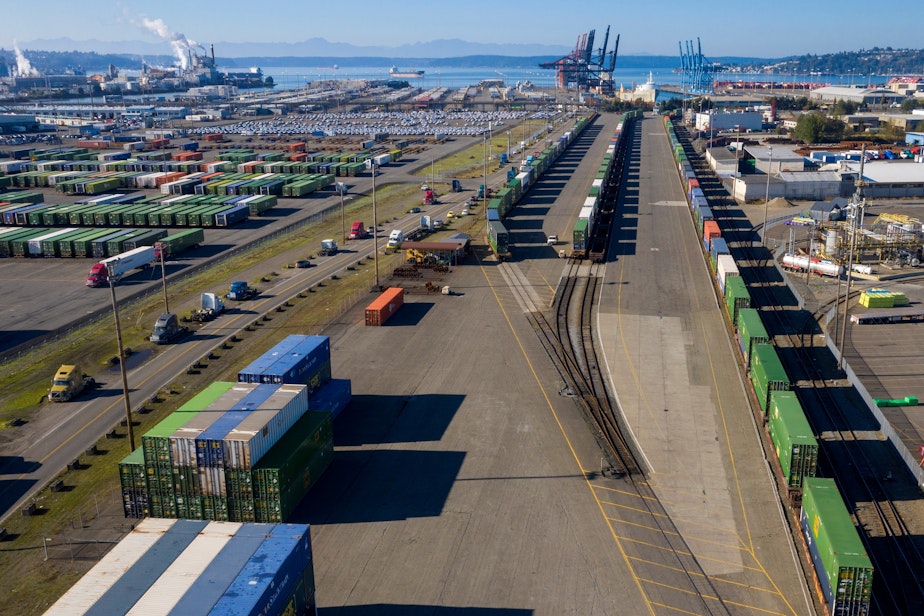Northwest ports pledge to stop air pollution (29 years from now)

The Northwest’s biggest ports promise to stop polluting the air — 29 years from now.
The ports of Seattle, Tacoma, and Vancouver, British Columbia, announced a common goal Wednesday: to eliminate diesel particulates and heat-trapping greenhouse gases from their operations by the year 2050.
The no-pollution pledge applies to trucks, buildings, and cargo-handling equipment at the ports and cargo ships while they’re in local waters.
Port of Seattle officials say the new strategy puts Northwest ports “in the vanguard” of national efforts to tame the environmental impacts of shipping.
Environmental groups in Seattle and Tacoma welcomed the gesture but not the pace.
“These issues are very urgent,” said climate-justice activist Adrienne Hampton with the Duwamish River Cleanup Coalition.
Sponsored
People in the diverse, low-income Duwamish Valley often breathe particulates and other pollution from the Port of Seattle.
“We believe the overall strategy really needs to accelerate their timelines for deploying zero-emission equipment,” Hampton said. “We can’t just wait until 2050.”
The City of Seattle’s Green New Deal law aims to eliminate carbon emissions in Seattle in a decade.
Global shipping giant Maersk says it will have carbon-neutral ships by the end of this decade.
In January, General Motors announced it would make only electric vehicles by 2035.
Sponsored
“We recognize 2050 is seemingly a long way off,” Port of Seattle maritime environment director Sandy Kilroy said.
She said the three ports are putting together much more specific pollution-reduction plans for the next 10 years later this year.
In 2017, the ports of Seattle and Tacoma resolved to halve their greenhouse gas emissions by 2030.
“The challenge of this industry is it’s global and it’s mobile. One port alone won’t make much difference compared to moving all ports together,” Kilroy said. “We’re trying to lift all the ports to send a clear message to the market that the industry needs to move along with us.”
“I view this plan with skepticism given their track record,” said Melissa Malott with Citizens for a Healthy Bay in Tacoma.
Sponsored
The Port of Tacoma missed a 2017 deadline for adopting cleaner-diesel trucks by two years.
“Any target that is failed or not met in time: Who’s going to be most hurt by that? That’ll be the near-port communities,” Hampton said.
The Port of Tacoma is also supporting Puget Sound Energy’s construction of a liquid-natural gas plant on port property, with much of the fossil fuel to be used by cargo ships calling at the port.
While construction of that gas plant is mostly complete, the Puyallup Tribe, environmental groups, and Washington state Attorney General Bob Ferguson are trying to block it from opening because of its climate impacts.
A hearing before the state’s Pollution Control Hearings Board begins Monday.
Sponsored
“The PSE LNG plant will actually be increasing greenhouse gas emissions into the atmosphere well beyond 2050,” Malott said.
Officials from the three ports say the ports need outside help – from state, federal, and international policies – to meet the self-imposed 2050 deadline.
In California, the ports of Long Beach and Los Angeles are aiming to use only zero-emission cargo-handling equipment by 2030 and zero-emission trucks by 2035.
In the short term, the Port of Tacoma plans to replace 6 of 8 diesel terminal tractors – off-road trucks that haul shipping containers around ports and railroad terminals – with all-electric versions this year.
Northwest port officials said they can’t match the pace of southern California ports’ transition to electric equipment without more climate-friendly laws passing locally.
Sponsored
Washington is the only West Coast state without a low-carbon fuel standard to encourage the manufacture and use of less-polluting fuels.
The Washington state Senate approved a low-carbon fuel standard late Thursday night. A different version passed the Washington House of Representatives in February.
The two chambers must reconcile the bills’ differences before Gov. Jay Inslee can sign a fuel standard into law.
Local ports lack jurisdiction over cargo ships for the vast majority of the nearly 6,000-mile voyage across the Pacific.
The Northwest ports’ pollution strategy only covers ships’ emissions for the 140 to 170 miles after they have entered the Strait of Juan de Fuca along the Washington-British Columbia border.
“Efficiency improvements that reduce emissions in our airshed would also reduce emissions throughout the transit,” Port of Seattle spokesperson Peter McGraw said in an email.
Shipping is responsible for about 3% of the world’s greenhouse gas emissions, according to the United Nations’ International Maritime Organization.
The global shipping agency has set a target of reducing the industry’s emissions 50% below 2008 levels by 2050.
About 90% of world trade is transported by ship.




